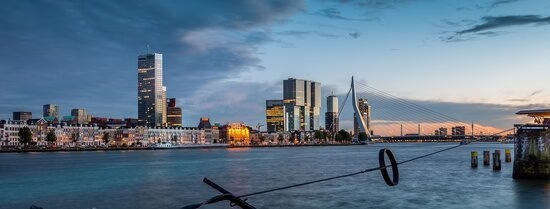Erasmus University Rotterdam (EUR) is launching an ambitious and innovative training program to educate experienced project managers as 'directors of the energy transition'. This is being done in collaboration with a consortium of leading companies and knowledge institutions. These directors play a key role in the complex energy and resource transitions in the port.
Port as a Center of Change
The Port of Rotterdam faces major challenges. Companies in the region must find solutions to issues such as grid congestion (a shortage of capacity on the electricity grid) and the supply of raw materials. At the same time, they must comply with laws and regulations and contribute to national ambitions, such as the transition to a circular economy. However, the energy transition not only brings obstacles, it also offers unique opportunities to develop the port into a global example of sustainable innovation.
New Ways of Learning and Innovating
Our university's project helps with this. Through a flexible education program and learning networks, we strengthen the skills of professionals in the port. This enables them to develop innovative solutions and contribute to the energy transition. The program is carried out in close collaboration with the business community, SME Rijnmond, and the Economic Board South Holland (EBZ). Rotterdam University of Applied Sciences also plays an important role in developing new methods of learning and innovation.
| Government Investment in Lifelong Learning (LLO) The government is investing 36.6 million euros in 39 projects within the Lifelong Learning (LLO) program. This initiative by Erasmus University Rotterdam is one of them. The projects focus on collaborations between employers, vocational (mbo), applied sciences (hbo), and academic (wo) institutions, as well as private training providers such as company vocational schools. The focus is on retraining and upskilling professionals for the energy and resource transition. |
Innovation Arena: learning in practice
A key component of the programme is the Innovation Arena, a platform where the 'directors' of various companies work together on shared challenges. Here, participants can exchange practical experiences, identify knowledge gaps and come up with innovative solutions together. This interactive learning process not only promotes personal development, but also strengthens the innovative power of companies within the transition.
"The Port of Rotterdam has a unique ecosystem in which innovation, research, education and practice come together," says Dr Larissa van der Lugt, Director of the Erasmus Centre for Port and Transport Economics (UPT). "Our studies show that there is not only a shortage of entry-level employees, but also a great need for further training of (project) managers at HBO and WO level. With this programme, we increase the innovative power of professionals and contribute to a sustainable future for the region."
Working together towards a sustainable future
The Erasmus Center for Energy Transition (ECET), one of the driving forces behind this initiative, sees the program as an important step in realizing the regional transition ambitions. South Holland has the potential to become an Energy Transition Valley. "We want to develop new ways of learning and working together, in which science and practice seamlessly merge," says Malou Kroezen, director of the ECET. "With this initiative, we offer professionals the tools to solve complex issues and help them to better position their organizations within the energy transition."
Jeffrey van Meerkerk, director of Strategic Relations at ManpowerGroup and chair of the Taskforce Human Capital Agenda, emphasizes the importance of collaboration: "In a time of labor market shortages and major social challenges, this program shows how education and business can invest in the future together."

